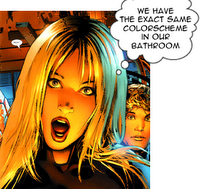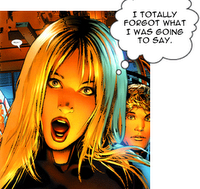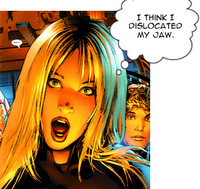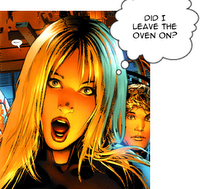You'd think it was the absolute first lesson in marketing: be nice to your customer. And yet somehow this basic message seems to have escaped the comics industry (genre TV has the same issue), which often seems to go out of its way to insult its core audience.
They seem to have forgotten that comics are no longer picked up by casual readers and the main support of the industry are the hardcore fans. Oh, they might show up at conventions, set up message boards to communicate with the fans, and respond to their questions as though they really cared what we think, and they'd be delighted to flog us any kind of merchandise they can think of, but how are comics fans actually portrayed in the comics themselves?
At best they are the socially inept comic relief or the geeky tech who can fix the hero's computer. At worst they are the sad, annoying, obsessive losers who have no life and no girlfriend. Because they are almost always male, too.
Is this any way to treat the people who pay your bills?
Sure, there are extreme elements in fandom, the same as in any other social grouping, but somehow it's always these types that turn up in comics. Never the regular people with rounded lives for whom an interest in comics is one of a variety of activities. And conversely we rarely get to see people with any other kind of obsession (not counting the villains whose whole purpose for existance seems to be making trouble for the hero)
Don't you feel insulted?
They've worked it out in Japan. For years now they have presented images of the geek as hero, the nerd as object of desire. There's everything from
Read or Die where women with great psychic power are also obsessive book collectors,
Oh My Goddess where the socially inept guy is surrounded by beautiful goddesses, to the non-fantasy
Genshiken, which follows the lives of a group of anime/manga fans. In each of these some fun is made of the obsessive fannish nature, but in a sympathetic, kindly way that is balanced by the depth of the characterisation. Plus of course these are the
heroes of the stories, rather than the comedy sidekick.
Isn't it about time American publishers learned this lesson?











